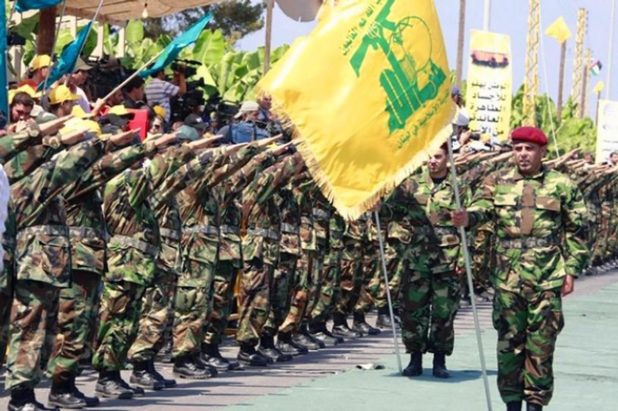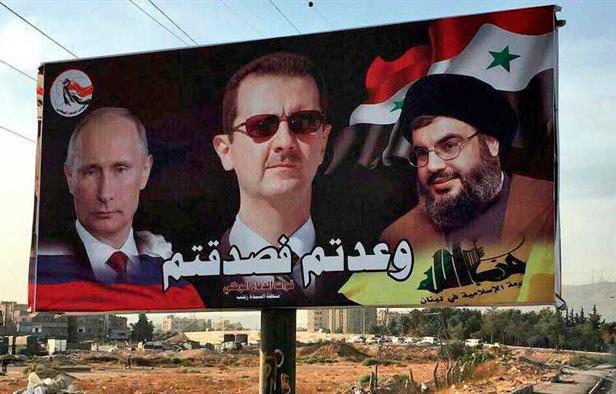Eric Striker
Daily Stormer
July 31, 2017

With the CIA withdrawing weapons and funding for Al-Qaeda and ISIS, Hezbollah has been busy exterminating the Jew-sponsored rats at a record pace. The last Al-Qaeda post on the Lebanese border was finally evacuated by the terrorists this week, and Hezbollah’s Syrian war experience and new Russian toys have given it decisive counters against Israel for the next inevitable tussle in the sandbox.
Rather than simply leaving South Lebanon alone and ending support for terrorists who kill Shi’ites and Christians, Israel has decided to double-down on threatening Hezbollah and Iran. As with all conflicts in this post-modern era, the rising tension is spilling over onto Twitter.
Hezbollah is not slowing down its relentless psychological warfare against Israel, in response to israeli threats to wipe out the clandestine Iranian weapons underground plants, both in Lebanon and Syria, which produce heavy missiles intended for the Shiite terror group, Nzivnet reported.
The picture above is part of this extensive psychological warfare, which includes tweeting propaganda images and hanging signs in front of Israeli communities along the southern Lebanese border.
The pictured Hezbollah soldier in the Syrian Qalamun Mountains, on the Syrian-Lebanese border, sends a cardboard message to Avihai Adre’i, head of the Arab media section of the IDF Spokesperson’s Office:
“Avihai Adri’i!
“We are practicing on the rebel organization Jabhat Al Nusra in preparation for invading the Galilee.
Signed: Twitter Channels Jerod Arsal and al-Qalamun.”
These are more than internet threats.
Even when Hezbollah was more isolated, it was a formidable force that uprooted Israel’s entire military doctrine. Israel tried to break Lebanese support for Hezbollah by targeting civilians in unspeakable war crimes, but their will was extraordinary. The July 2006 war remains the greatest military upset of the 21st century.
Fast forward to the present-day and Hezbollah has lots of new friends and gadgets, making a direct conflict with them even more difficult. With the Sunni terrorist wing of the Zionist alliance about to perish, it leaves just America, Israel and a handful of Kurds against the Middle East’s entire Shi’ite, Christian and nationalist populations.

The neocon kike Elliot Abrams has translated some of the Hebrew-language conspiring into the English language.
The fear is palpable.
He writes for the Council on Foreign Relations:
During the Obama years, concerns about Israel’s security situation focused on the Iranian nuclear weapons program. Today, the focus is changing: to the growing Iranian military presence in Syria, the growing military strength of Hezbollah, and the possibility of a devastating Israel-Hezbollah conflict.
That is the subject of a new article in Strategic Assessment, the magazine of Israel’s Institute for National Security Studies. Entitled “Political and Military Contours of the Next Conflict with Hezbollah,” it was written by Gideon Sa’ar and Ron Tira. Tira is a strategist who was a long-time Israeli Air Force officer and pilot; Saar is an influential Israeli politician who was for 11 years a Likud member of the Knesset.
It’s dangerous to try and summarize a complex and in many ways worrying text, but I will try. First, war is possible: “A conflict could break out due to a miscalculation, a failure in strategic communication, or uncontrolled escalation.”
Hezbollah’s build-up of precision weapons presents an enormous threat to Israel, as does the growing Iranian presence in Syria. Together, this may constitute “an attempt by Iran and Hezbollah to reach a strategic balance with Israel, or even to gain the capability to launch a strike that will cause significant damage to critical (military and civilian) systems in Israel.” How so?
In certain senses Israel is unusual in its vulnerability to precision weapons, as on the one hand it is a Western country with advanced critical infrastructure, and on the other hand, it is a small country with concentrated critical infrastructures and little redundancy. Regarding electricity generation in Israel, for example, out of a capacity to generate about 17,600 MW of electricity, 28 percent is installed in only two sites (with 10 cumulative production units – turbines, for example). The six largest electricity generating sites in Israel (including private ones) account for 51 percent of the national capacity for electricity generation (using only 26 production units). Thus the threat represented by even a small number of precision missiles that breach Israel’s countermeasures and strike critical systems, such as electricity generation, could be unprecedented. The picture is similar with regard to other critical systems, such as national electricity management; natural gas infrastructure; sea water desalination (only five facilities supply about half of Israel’s drinking water); and many other examples from civilian and military fields.
…
In addition to the Hezbollah build-up, the presence of Iranian forces in Syria is a new development that did not exist when Hezbollah and Israel last fought, in 2006.
Therefore, Israel must examine whether to define a red line of Iranian military buildup in Syria, and if so, be prepared to advance in escalation as far as is necessary in order to prevent such buildup. Growing Iranian military presence in Syria could force Israel to look at the Syrian and Lebanese theaters as one whole. Israel will have to consider whether to continue accepting Iranian activity via its proxies and covert forces, and operate against these proxies – or to act directly against Iran.
Why is all this happening now? Sa’ar and Tira theorize that the JCPOA, the Obama administration nuclear deal with Iran, may be the culprit:
Indeed, it is possible that the temporary and partial suspension of the Iranian nuclear program is incentivizing what looks like an attempt to reach a strategic balance against Israel in other spheres (to some extent as compensation for suspension of the nuclear program), resulting in a dynamic of escalation. These processes could very well put the regional system at a crossroads, and raise the probability of war.
There is one other new development: the role of Russia in Syria, which was not present during the 2006 conflict. As the authors note, “any hostilities on Israel’s northern border could include or spill over into Syria for a range of reasons.” The Russian presence makes the entire context different:
Israel has the ability to pose a real threat to the Alawite regime, and to degrade the forces defending it significantly. An extension of the fighting to Syria, and in certain cases fighting in Lebanon that projects into Syria, could interfere with Russian attempts to stabilize its own order in Syria.
Therefore, Russia could try to limit Israel’s political, strategic, and even operational freedom to act. At the same time, Russia is a new element affecting the conduct, restraint, and deployment of all parties, the nature of any possible settlement in Syria, and the possible termination mechanisms for ending a conflict. Russia’s new role in the arena could both coerce Israel and enable it to achieve political and strategic objectives using short, limited, and gradually escalating applications of force, combined with political dialogue with Russia and the United States – and it is possible that in certain circumstances such a framework should be the defining idea of Israel’s concept for fighting in this arena.
In other words, they are depending on the Russians and Iranians to be diplomatic in order to gain an edge. The Jews may in the near future let up on attacking Trump for trying to mend ties with Russia if it means they can get on Putin’s good side – but this is just speculation.
As for the rising prospect of conflict, there’s no organic reason why beautiful East Mediterranean countries like Syria and Lebanon should be experiencing these wars. The problem in the Middle East lies with Jews agitating Sunnis (who are generally dumber and more racially Arab than Shi’ites and Christians) as pawns to create permanent sectarian violence. It’s uncannily similar to how they use blacks against whites in America.
After a good nosejob, some Persians look basically like white people.
The fact that Shi’ites in Iraq, Lebanon and other nations engulfed by American sponsored terrorism haven’t retaliated against Sunnis after all the unprovoked suicide bombings and barbaric murders is a testament to their good will and patience.
In other words, American foreign policy should cease all support for Saudi Arabia and Israel and throw its diplomatic clout behind civilized countries like Iran and Lebanon. If we established ties with the normal people in the Middle East instead of the psychopaths and freaks it would be a much better place to live. By extension, the blow back Trump complains about – like the “refugee crisis” and Sunni terrorism in the West – would not even be a factor in our lives.
Know Israel, no peace!
No Israel, know peace.
 Daily Stormer The Most Censored Publication in History
Daily Stormer The Most Censored Publication in History



